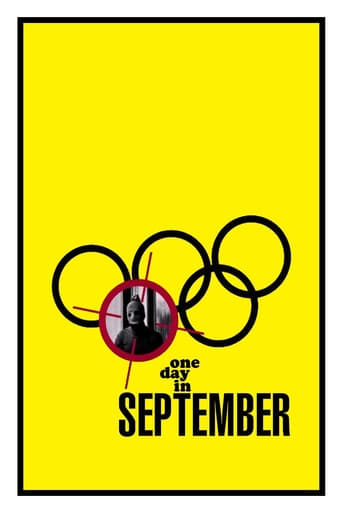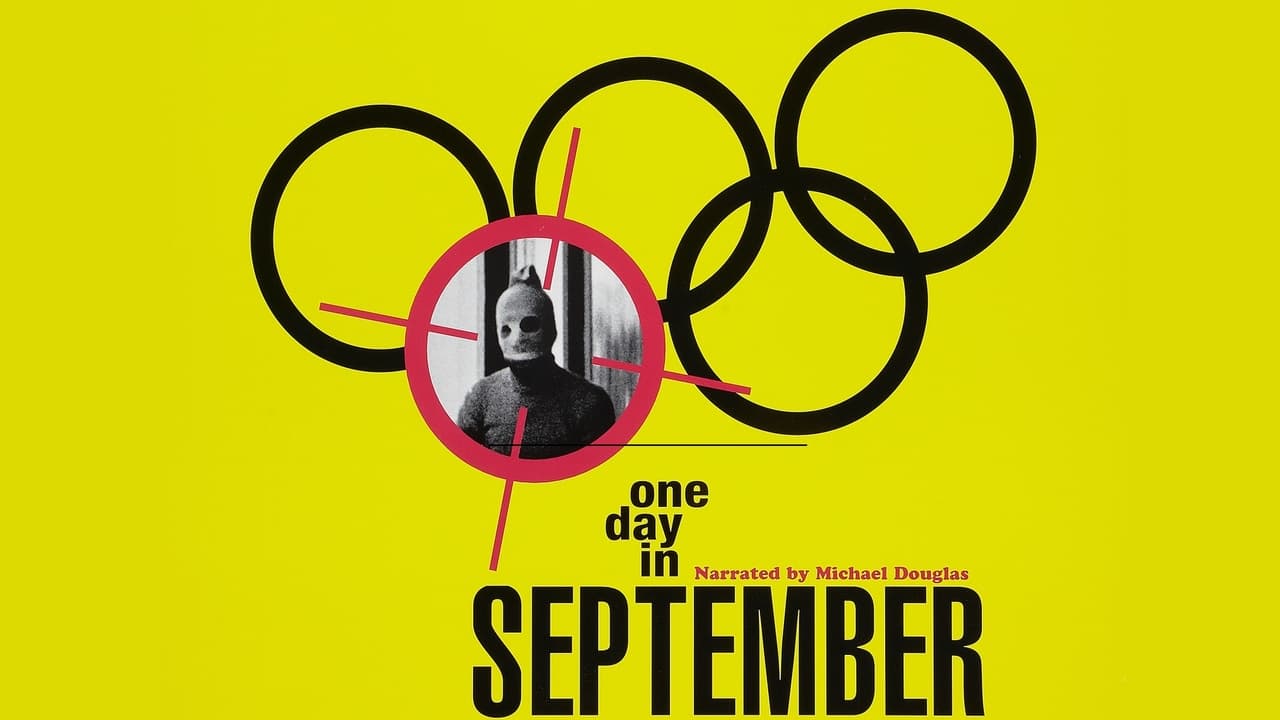virek213
Whether winter or summer, the Olympic Games are meant to be a place where the world comes together for the ultimate competition in athletics. It is the ideal that dates back to ancient times when the Greeks themselves invented the Olympics.But on September 5, 1972, in an ordeal that lasted into the early morning hours of the following day, the Olympic ideal was brutally attacked when members of a shadow Palestinian terrorist group known as Black September hopped over the fence at the Olympic Village in Munich and killed two Israeli athletes, holding nine others hostage and threatening to kill them unless their demands for freeing two hundred political prisoners were met. With Israel point-blank refusing to negotiate, and having to take responsibility for this, a rag-tag German hit squad unleashed their firepower on the terrorists at the Furstenfeldbruck airfield just outside of Munich; and although three of the eight terrorists were eventually captured and the other five died in the mêlée, so too did the remaining nine Israeli athletes. It was the first act of terrorism ever televised to an international audience; and in 1999, it was the focus of the Oscar-winning documentary ONE DAY IN September.Narrated by Michael Douglas, ONE DAY IN September examines, in a span of only ninety-one minutes, the way the 1972 Summer Olympics were laid out, and how it led to what took place. Munich was, just four decades before, the epicenter of the Nazi movement; and when it was awarded the '72 Games, memories of Hitler's 1936 Berlin Games, as well as the horrors of World War II and the Holocaust, were still fresh in the population's memories. The organizers of Munich '72 were determined to make it as different from "Hitler's Games" as was humanly possible; and while theirs were noble and good intentions, it turned out to be their undoing. The perimeter of the Olympic Village was a mere rusty fence, as opposed to sturdier materials like barbed wire (so as not to look like a concentration camp like Dachau, which was only seven miles away), and the security guards not only had no visible firearms on them, they didn't even look like security guards to begin with. This was how the eight Black September militants scaled the fence, with the unintentional help of drunk American athletes, and broke into the Israeli apartment at Connollystrasse 31. A great deal of negotiating between West Germany and Black September ensued, and the world was transfixed to their televisions, as they watched what had been up to that moment a peaceful Olympic celebration suddenly turned into the most overt act of terrorism the world had seen to that point.Attempts by the West German government to end the standoff by force were totally unsuccessful (the country had no counter-terrorism force of its own, and relied on municipal cops); and when the terrorists and the hostages were transported by helicopters to Furstenfeldbruck, the situation took the ultimate horrifying turn. A whole horde of untrained German snipers unloaded on the airfield; and over the next forty-five minutes, all hell broke loose. Once the mêlée was over, officials of the West German government and the Munich Olympic Committee had stated that the terrorists had been killed, but the Israelis had been saved. Later on, of course, it was revealed that something totally different had transpired. It was up to ABC sportscaster Jim McKay to deliver the terrible news to the world: "They're all gone." People who remember those terrible two days in September 1972 will certainly be reminded of them again when watching ONE DAY IN September; and those who only know of 9/11 will be reminded of how terrorism can turn good things bad in a hurry. The whole ordeal, down to the last horrifying battle at Furstenfeldbruck, was an act of well-meant but painfully inept West German planning; and while the decision to go on with the Olympic Games after the deaths may have been a way of both paying tribute to the murdered Israelis and thumbing its noses at terrorists, it was also extremely controversial. Scenes of athletic competition, including those of U.S. swimmer Mark Spitz and Russian gymnast Olga Korbut, are interspersed with the horrific events at Connollystrasse 31 to emphasize the tragic turn Munch '72 took in the span of only eighteen hours. The mood is emphasized further by Heffes' modern score, with contributions by Glass, and a performance of the Funeral March of Beethoven's Eroica Symphony, as performed by Rudolf Kempe and the Munich Philharmonic at the memorial for the athletes. In the end, ONE DAY IN September was richly deserving of the Oscar it got, and it should remind us all of how political terrorism not only poisoned the ultimate sporting event, but also led to far worse things to come.
Bill357
Having watched the film 21 Hours At Munich the day before, I expected a little more from this and was slightly disappointed. It recounts the actual events very well but little more. Very little time is spent digging into the thoughts and emotions of the principles involved.I learned a little more about a few of the Israeli athletes but the interview with the only surviving terrorist was actually quite pointless. Nothing much was gained from talking to him except the fact that he's still quite proud of the atrocities he committed against innocent people. I seriously hope a bullet finds this man before he is allowed to die of natural causes.I agree with other reviewers that blasting Deep Purple's "Child In Time" while showing a slide show of the burnt and shot corpses of Israeli athletes and their captors was very gratuitous. It would have been more effective and more respectful if that scene were silent.The most disturbing claim of the film (narrator Michael Douglas could hardly hold his disgust) was the charge that Germany colluded with Black September to have the three surviving terrorists released under false pretenses. It's quite ironic that what started as an attempt to clean up the stain of six million murdered Jews ended up not only with more murdered Jews but Germany denying justice for their murders. Hypocrites!Now what I'd like to see is a documentary about the reprisal killings. The fiction that was Sword Of Gideon and Munich will not suffice.
mickoc
It hardly comes as a surprise to find that many a rabid left wingers nose will be firmly knocked out of joint with a film such as 'one day in September'. No rose tinted spectacles here. This is not an Al jazeera offering. They are forced to view the murderous nihilistic reality of their beloved freedom fighters. So faced with cold hard facts which cannot be readily explained away they try another defense, namely accuse the film of being one sided and not show the situation of the Palestinians.One question: Is it a documentary about Palestine or about Munich in 1972? To be fair there is quiet a bit early on to put the situation in some sort of perspective and the surviving terrorist and his opinions are given plenty of air time.You don't hear much crying from the same quarters decrying one sidedness or bias when Michael Moore makes one of his ridiculous, so called, documentaries. I think most people are familiar with the Palestinian situation, but i, for one, had not heard anything about the madness that happened in Munich in 1972. When Kevin McDonald set out to make a documentary on what happened there then its hardly surprising that we see a film dealing with the events on that terrible day. If he set out to make a documentary on Palestine and how it was taken off the Arabs by the Jew's then he would have set to that task and not dwelt too much on how the Jew's had been banished from there two thousand years ago after moses had been promised this and that.As with the BBC journalist crying when Arafat was lifted out of his compound for the last time or those who would attempt a defense of the Palestinian murder spree in Munich there seems to be a different reality or level of understanding needed when it comes to issues about Palestine or its people so its hardly surprising that a documentary like this would raise hackles.This is an excellent film.
LonesomeDove
I feel compelled to reply to the many people who say the documentary was completely biased toward Israelis. True, its focus was on the Israelis and their lives, and how they were killed by "evil" fundamentalist Palestinians. However, if you say the film is biased, then you're saying that maybe it should lean a little bit the other way, and tell more about the Palestinian terrorists and their personal plight in the conflict. But how can anyone be sympathetic to terrorists? The point has been brought up that both sides of the conflict experience terrorist attacks, so why should a filmmaker focus on one side more than the other; however, I think the fact that this attack took place at the Olympics, an event that represents the unity of the world and its people, is what makes the attack and this documentary so important. Therefore, Kevin MacDonald, in my opinion, has license to be as biased as he wants toward the Israelis, because they were the focus of this terrible event that occurred during a time that people around the world should have been united under the Olympics banner.


 AD
AD




